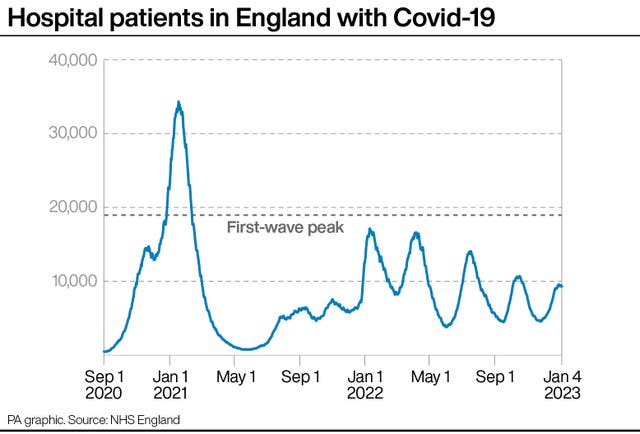Covid-19 infections in the UK have jumped to their highest level since the summer, with nearly three million people likely to have had the virus over Christmas, the Office for National Statistics said.
An estimated 2.97 million people in private households are estimated to have had coronavirus in the week ending December 28, more than double the number at the start of the month.
At the same time, flu cases in hospitals in England are continuing to rise while ambulance handover delays have hit a new high, as the NHS continues to struggle with bed shortages and a surge in winter viruses.
Prime Minister Rishi Sunak acknowledged on Friday the NHS is under “enormous pressure” and repeated his commitment to tackling waiting lists while once again blaming the Covid-19 pandemic for the current challenges.
An average of 5,105 flu patients were in general hospital beds last week, up 47% on the previous week and nearly seven times the number at the start of December, NHS England figures show.
Patients in critical care beds have also jumped sharply, up 26% week-on-week from 267 to 336.
At this stage last winter, just 38 patients were in hospital with flu and only two in critical care.
Flu admissions to hospitals fell over Christmas, but it is too soon to see this reflected in the overall total of flu cases and the data may have been affected by reporting delays during the festive period.
The number of deaths registered in England and Wales in the week before Christmas was 20% higher than the five-year average, with deaths due to influenza and pneumonia having increased in recent weeks, according to the Office for National Statistics (ONS).
Meanwhile, ambulance handover delays climbed to a new high in the week to January 1, with more than a quarter (26%) of patients waiting over an hour to be handed to A&E teams and around four in 10 (44%) waiting at least 30 minutes.
This compares with 10% waiting over an hour at this point last year while 23% waited at least half an hour.
The high level of delays reflects the ongoing struggle faced by hospitals to find space for new arrivals.
An average of 12,809 beds a day last week were filled with patients ready to leave, up almost a third on the figure for this time last year (9,858).
Speaking to broadcasters during a visit to a school in London, Mr Sunak said: “The NHS is obviously under enormous pressure as we recover from Covid and I have enormous admiration for all the people working incredibly hard in the NHS right now to help get us through that.
“We are supporting them with billions of pounds of extra funding but in particular this winter what we want to do is make sure we move people out of hospitals into social care, into communities – that is one of the most powerful ways we can ease some of the pressures on A&E departments and ambulances that are waiting too long.”
The latest figures also show that:
– The NHS 111 service answered 410,618 calls last week, up from 365,258 the previous week and the second highest weekly total on record.

(PA Graphics)
– The number of people in hospital in England who have tested positive for coronavirus looks to have levelled off at just over 9,000, having been on an upwards path since the start of December, though it is too early to know if this is the start of a trend.
– Bed occupancy levels remain high, with more than nine in 10 beds (93%) filled by patients last week.
Matthew Taylor, chief executive of the NHS Confederation which represents the healthcare system in England, said the data “underlines the stark reality of the pressures that NHS leaders, their staff and patients are enduring.
“As they wearily enter a new year, our members say they continue to manage crisis conditions with inherent risks to patient safety as the prospect of sustained industrial action looms large.”
He added that delays in discharging medically fit patients means “we will continue to see patients held in hospital corridors as they wait for a bed to become free, ambulances queuing outside of hospitals which will lengthen waiting times and the danger of more patients being discharged into inappropriate settings because hospitals are desperate to free up beds.”
NHS national medical director for England Professor Sir Stephen Powis said: “We knew this winter would be one of the most difficult in the history of the NHS and I want to thank staff for all their hard work in caring for and treating so many patients while dealing with record demand on services, including the enormous pressure from flu and Covid.
“The plans we announced last autumn will help ensure we are in the best place possible to provide care for patients at this incredibly challenging time, with extra call handlers in place, community services established to help keep people out of hospital where possible, and we’re also continuing to make good progress to put the equivalent of 7,000 extra beds in place by March.”







